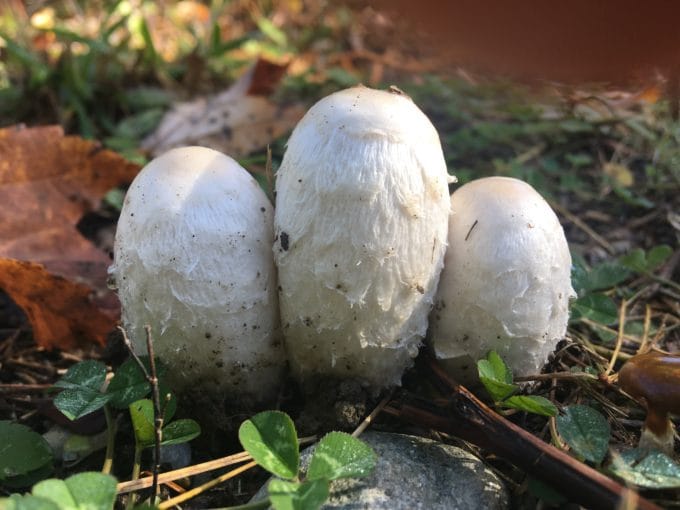Once again, it’s mushroom season in Maine. Periods of rain, foggy mornings, early frosts and insulative leaf litter summon the mycelium to shoot forth great masses of fruiting bodies, known commonly as mushrooms. This post will lay a framework for teaching you the basics to easy to ID edible Maine mushrooms.
These lovely, eye-catchingly bright and drab brown fixtures of the forest floor can be either delicious or deadly. Beware of the temptation to nibble a mushroom you are unsure of identifying. For beginning foragers, it’s best to stick to the top few easy to ID edible Maine mushrooms. After I get some good photos of some other edibles, I’ll add them and link to them in this post.

 Before heading out, buy a good reference book or two. A solid field guide can be hard to wrap your head around, but just can’t be replaced by a novice book. I recommend the National Audubon Society Field Guide to North American Mushrooms (National Audubon Society Field Guides) by National Audubon Society.
Before heading out, buy a good reference book or two. A solid field guide can be hard to wrap your head around, but just can’t be replaced by a novice book. I recommend the National Audubon Society Field Guide to North American Mushrooms (National Audubon Society Field Guides) by National Audubon Society.
An additional book specific to your area with less, more sought-after mushrooms is a good second choice. For New England, I recommend Edible and Medicinal Mushrooms of New England and Eastern Canada: A Photographic Guidebook to Finding and Using Key Species by David L. Spahr for a secondary source.
I’ve looked for some good apps—don’t bother. They have crap photos, poor descriptions and one even listed two edible mushrooms as poisonous. Both books can be purchased for about $30––a petty cost for saving you from a deadly, or sickening mushroom misidentification.
If your town has a local bookstore, consider visiting them. If they don’t have it, they would be more than happy to order it for you. Keep your money close to home when you can.
Chicken of the Woods
A large brilliant egg yolk yellow and orange juice colored shelf mushroom connected to decaying stumps, trunks and recently fallen trees. The colors created banding rings showing the days of growth on the top. The soft underside feels a bit like firm memory foam. These mushrooms are best eaten when the colors are brilliant and the mushrooms are less than ten inches across at the widest point. When they begin to turn white they toughen. Upon first fruiting chicken of the woods will have thicker, brilliant yellow edges. After they begin to mature, the edges become fringe-like and droop downwards. The texture is firm and when cut open the inner flesh is and lighter colored inside than out.
Other common names are Chicken Mushroom and Sulphur Shelf. This lovely bloom was on a tall white pine stump just twenty feet from the chicken coop. I often notice them growing on large, old trees in cemeteries, suburban yards with tree along the roadside and they rarely actually touch the ground.
Honey
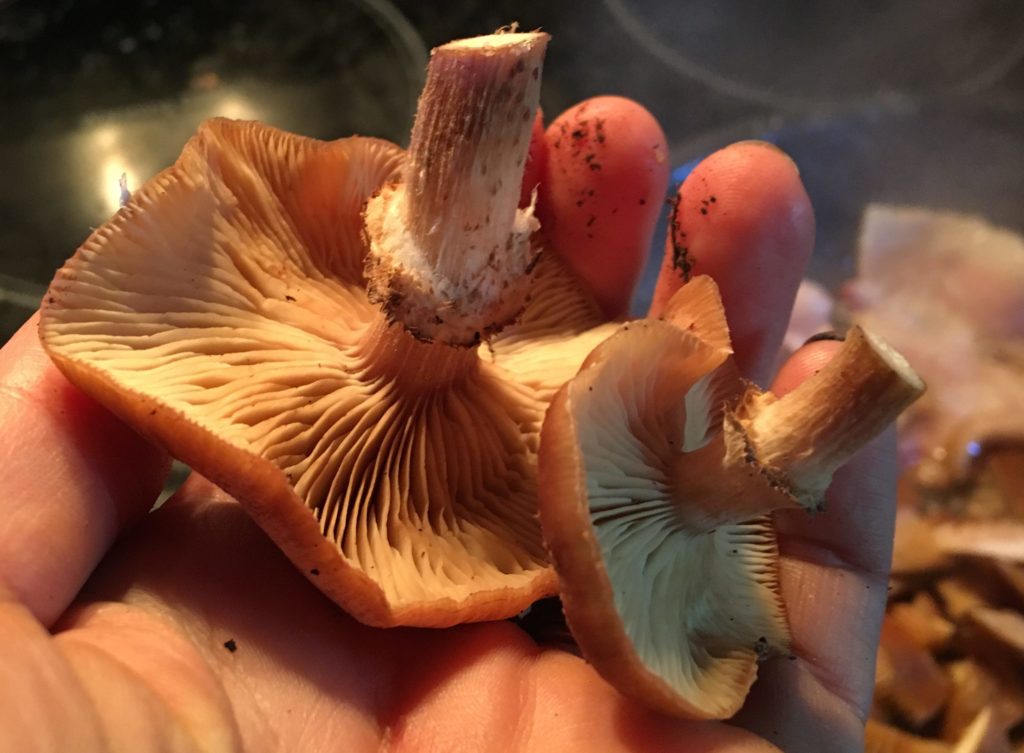 Honey mushrooms are often in large clusters pressing against each other in various stages of fruiting. They like bases of older trees which have areas of decay, stumps and soft forest floors layered with leaf matter and underlaid with networks of rotting woody matter, roots and prefer partial shade.
Honey mushrooms are often in large clusters pressing against each other in various stages of fruiting. They like bases of older trees which have areas of decay, stumps and soft forest floors layered with leaf matter and underlaid with networks of rotting woody matter, roots and prefer partial shade.
Honey’s have large, wide-brimmed caps which often appear wavy, lop-sided and floppy looking with younger specimens smooching their way up, around and under them. Caps are rounded, but imperfect with a darker center and lighter toward the edges. There is no central bump or dent like in some similarly colored and shaped mushrooms. Younger buttons are short with caps enclosing the short, irregular, wavy gills—this enclosed section later becomes a slight ring, or frilly skirt around the stem about an inch under the cap. The gills are just barely connected to the stem in a slight downward arc.
Not all Honeys come up in a cluster or will have the frilly line around the stem—but only eat the ones that do just to be safe. Some have only a faint line where it was once connected. COOK THEM ALL THE WAY THROUGH.

Tiny patches of dark brown hairs evenly spread out on the cap radiating from the slightly darker center. These tiny hairs are a tell-tale indicator making this a top easy to ID edible Maine mushroom. To check the spore print, lay a stemless cap flat on a dark slip of paper and leave it for a few hours and a lift it to find an ivory, off-white spore print.
The stem of a honey looks stringy and sometimes little scales break away from the outermost layer. It is solid inside, but begins to loosen up and voids may appear in older, much larger specimens that have begun to go by. The stems are darker ivory to tan in color and is generally lighter in color than the cap.
Other online resources:
Shaggy mane
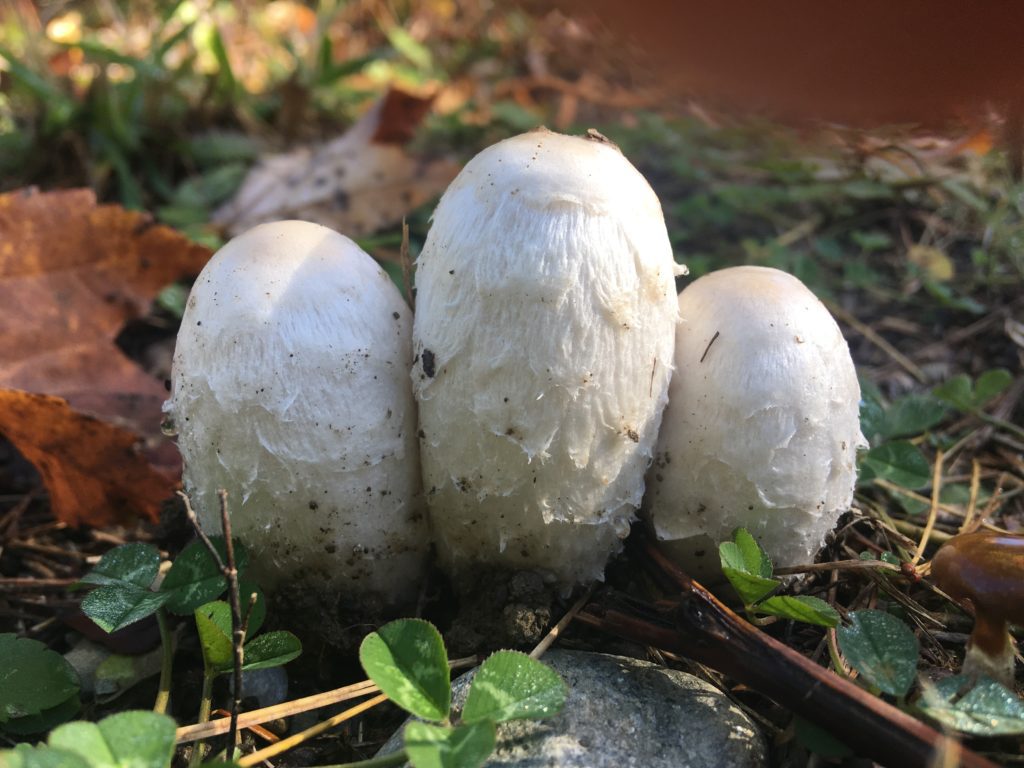
These little easy to ID edible Maine mushrooms are about four inches tall. The cap looks like an elongated egg with shaggy, scale-like brilliant white scales. From a distance it looks like a carton of white eggs have been set on end in a random, often ring-like pattern on the ground. To help insure a proper ID, only pick ones in clusters of two or three or within a few feet of others. Gills are underneath this oddly concealing cap in tightly formed and tidy wide blades which are not connected to the stem. Upon checking the gills, you’ll quickly notice this easy to ID edible Maine mushroom is very fragile, easily pulls apart, and spoils quickly so must be eaten the same day. The photo above was taken on October 14th, the one below on October 15th.
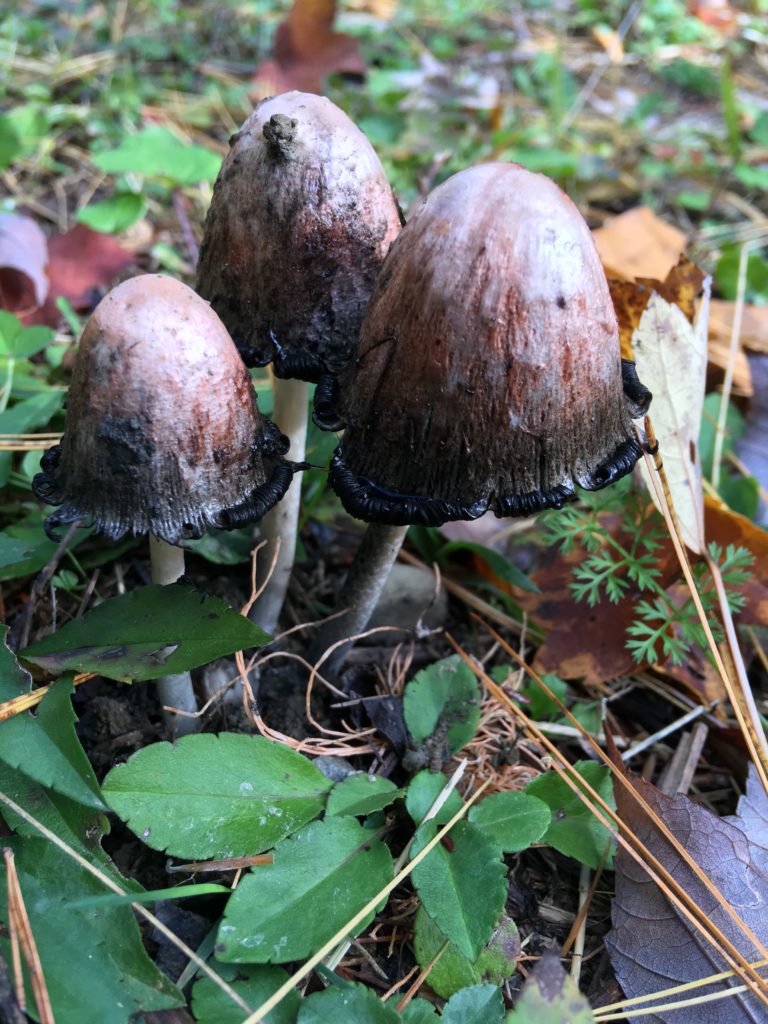
If you visit the same stand a day later, the mushrooms will offer a much different appearance with the caps extending out like a partly opened umbrella with browned curled-up edges. By the evening of the 16th, two days after the stand of shaggy manes first appeared, they had completely flattened to a brown muck, easily mistaken for a loose, dark animal scat. Once they are a couple of days old they drip goo from the edges, appear molten and disintegrate rapidly. This drippy dark ink look explains the namesake for the family of mushrooms which is inky caps. Not all inky cap mushrooms are edible, so do take care in picking only mushrooms meeting this definition—which is unlike any of the others in the Inky cap family. Waiting for a few to mature and checking back a day or two later is a fail safe to this already easy to ID edible Maine mushroom. Not to fret, shaggy manes often come up in waves and when one cluster has gone by more will begin to push up.
The long, thin stem is straight, white, straw-like hollow, mostly covered by the oblong cap when fresh and most palatable. As it matured, the stem grows plus the cap opens and shrinks to make the stem appear much longer although the mushroom hadn’t grown more than half an inch in this time.
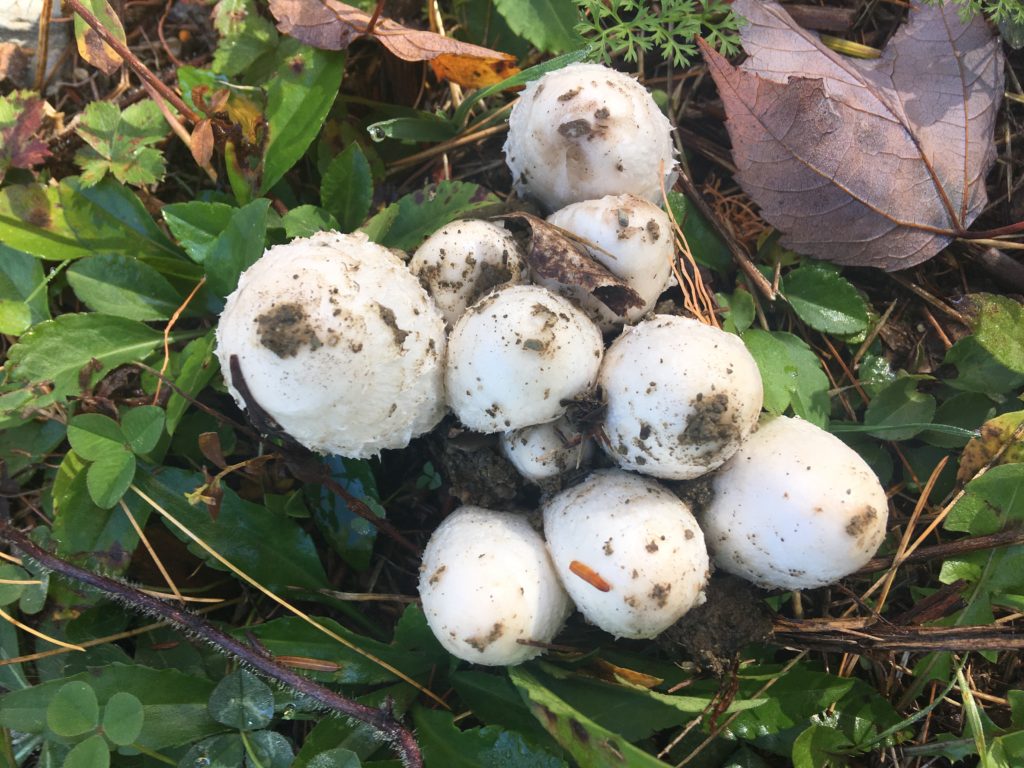
Surprisingly, this mild tasting easy to ID edible Maine mushroom is very common on front lawns and even reportedly through cracked tar parking lots in more urbanized areas. These delicate and delicious mushrooms are found in early spring, fall and onto early winter. They are drawn up by cool, wet weather and especially after long periods of light rain and fog.
